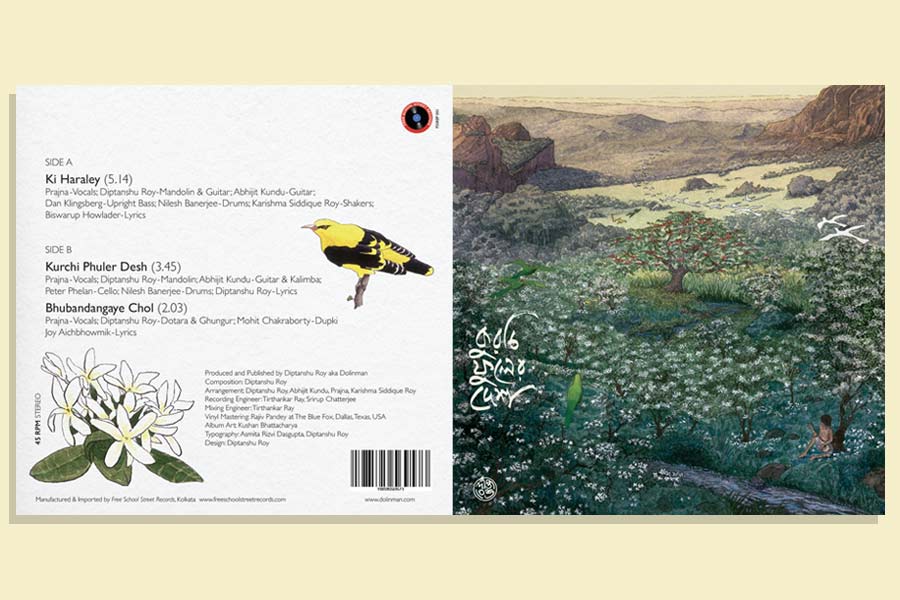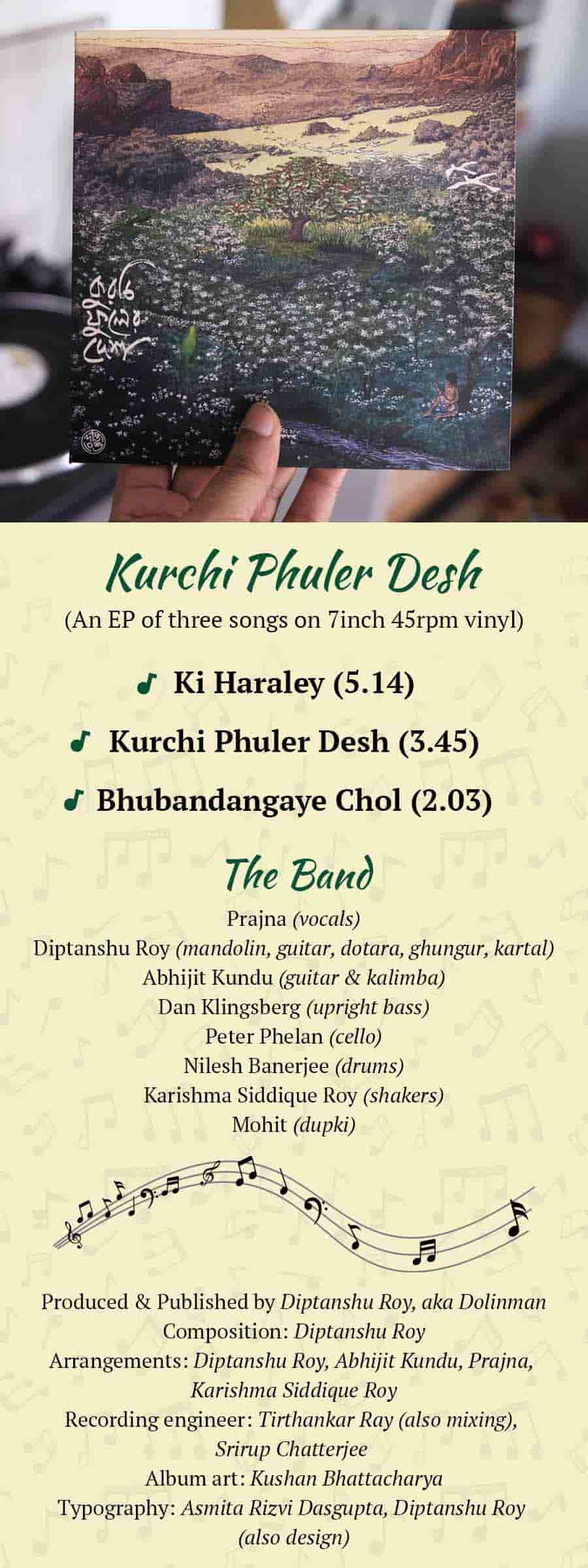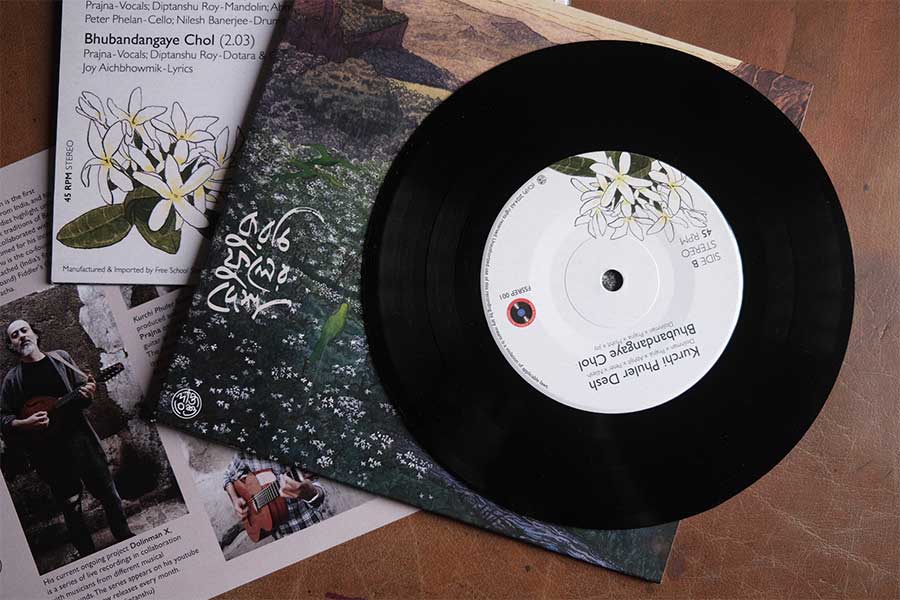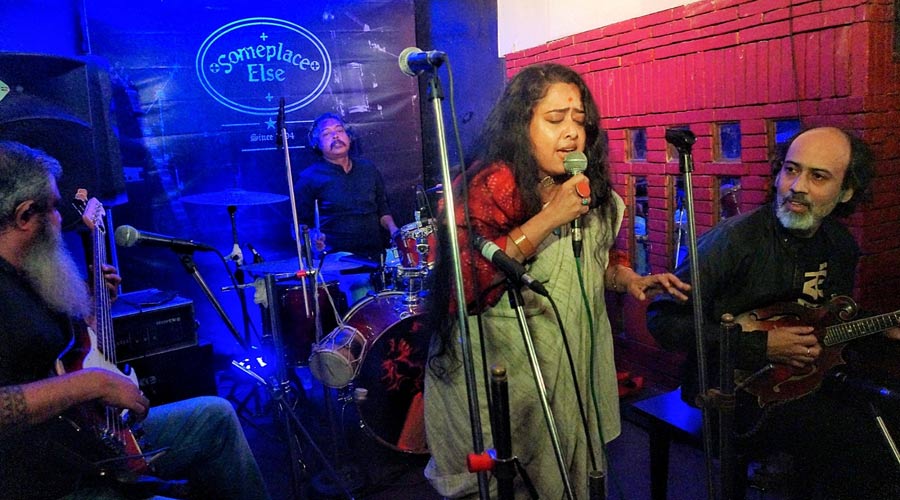The fragrance of a flower, etched in memory and a place, is at the heart of Kurchi Phuler Desh, a sparse bouquet of songs that takes us through a neverland of mind games, courtesy a 7-inch vinyl that plays at 45 rpm. Diptanshu Roy’s latest passion project is a stab at the heart, in a nice way; the contradiction possible only because it’s music from the soul.
Diptanshu, aka Dolinman, is the Mandolin Man who is familiar to, and loved by, many. Surely more than the over 86k followers of his YouTube channel, which showcases, among several creative projects, his ongoing Dolinman X series of live recordings featuring varied collaborations with musicians from across genres. In Kurchi Phuler Desh he mines a childhood love, a Mohiner Ghoraguli EP he inherited from his father. Not in the least surprising that it is Shongbigno Pakhikul O Kolkata Bishayak, the debut disc of the iconic trail-blazer of Bengali rock music of 1970s Calcutta.
Now over four decades later, an EP of three Bangla songs of his has been pressed, thanks to Freeschool Street Records. And Dolinman is at the centre of it. “For Dolinman X, I was mostly releasing traditional pieces and some Mohiner Ghoraguli songs that I grew up listening to. Many of my fans on YouTube kept asking for releases on streaming platforms,” says Diptanshu, the first full-time Bluegrass mandolin player from India with renditions of Bengali folk melodies that highlight the unlikely parallels between the folk traditions of Bengal and Appalachia. “I have always dreamt of having my own EP. I felt that it would be great to produce some original content for streaming,” he says. So, along with a release on streaming platforms, there’s an EP too.
The song, Kurchi Phuler Desh, is mellow at start, the soft strains of the mandolin making way for a serene universe of birds and trees. It is a place of bliss, of joyous abandon, celebrated with poise leading to gentle brushstrokes of the drums that allow the cello to unspool. Beautiful.
Diptanshu, however, chooses to be modest. “This is the first song that I have written and composed in Bengali,” he says about Kurchi Phuler Desh. “Though I feel it lacks songwriting flair, I still had to put this out because of how personal it is to me.”
The flair, we believe, comes from its disarming simplicity. Like the manner in which the mandolin meanderings heighten the overriding emotion of Ki Haraley, a song about deep love and loss told through stories of old homes that are deserted and razed to the ground over time. The song picks up pace towards the end, the strings morphing into an exquisite gypsy dance as it were. Prajna’s vocals add grace to the settings. She’s consciously playing it down in both tunes allowing a harmonious mix of the words with the music.

Album art is by Kushan Bhattacharya, design: Diptanshu Roy
The third track that makes up the EP on vinyl is the bouncy Bhubandangaya Chol. Let’s hold back details on that for the benefit of those who lay their hands on the record. For, it is meant to be a bonus. Suffice to say that the instantly identifiable strains of Bhubandanga are quintessentially Bengal.
Diptanshu is chuffed no end that the EP is ready. “I am told by Aveek Chatterjee of Freeschool Street Records that it’s quite a landmark. For, it's almost four decades since original independent music is getting pressed on a 45rpm vinyl.”
Now, over to the Mandolin Man himself. In a conversation with The Telegraph Online, Diptanshu opens up on his world that’s usually made up of long stays in Santiniketan with wife Karishma, morning walks on Visva Bharati campus, and his abiding love for David Grisman, affectionately christened “Dawg” by none other than a certain Jerry Garcia.
I find the title track to be a celebration, the kind we do quietly. Tell me about Kurchi Phuler Desh, beginning with the flower itself.
The idea of the song came during the pandemic when I was stuck at home for about two years doing everything remotely; sitting at my desk by a large window in my 300-year-old ancestral home. The time was dark in the backdrop of personal loss.
One thing is for sure, the mind never stops travelling. In 2022, Karishma (wife) and I could finally take a short break in Santiniketan we call our second home. It was spring and we lived amid the fragrance of kurchi flowers, a delicate, white bloom with jasmine-like fragrance and perhaps a hint of neroli. I have always associated kurchi with the Visva Bharati campus. I would very often take my morning walks there, discreetly I may add, at times taking breaks under the kurchi trees.
Obviously, all this is very personal to you.
My oldest association with the flower, however, is with my dad, an avid gardener and nature lover, whom I lost in 2020. He introduced me to this particular bloom many years ago, and he had even requested me to get a sapling (which usually springs in July) for him. He could, in fact, tell me the exact location of a tree in Purbapalli where I could find the saplings. So, the song is, in many ways, an amalgamation of my many trips to Santiniketan.
Ki Haraley is descriptive with an underlying sense of melancholy. The song, particularly your mandolin, took me back to Jewish guitar music I had heard while in Jerusalem over a decade ago, when Israel was still sane enough to visit.
As a mandolin player, I consider David Grisman as one of my gurus. His album Songs of our Fathers (with another ace Andy Statman) has been one of my favourite albums of old Klezmer traditional songs in which mandolins take centrestage. The key musical ideas and arrangements of Ki Haraley, I feel, take inspiration from the album, perhaps unconsciously. The melody came to me first. Then it was Biswarup Howlader who came up with the amazing lyrics about how in our city beautiful old homes are being deserted, abandoned and then knocked down.
Why is Mohin’s first EP on 45, released in 1977, so special to you?
It is my coolest possession. And I was born in 1977 too! I always felt deeply connected to that record which I had inherited from Baba. I was fascinated by the format and nurtured the hope that one day I could perhaps put out my own EP. With vinyls making a comeback and with encouragement and support from Freeschool Street Records who published it for me, the seemingly impossible turned possible!
The feel and tenor of the songs are, naturally very you, given your love for anything and everything acoustic.
Absolutely, this long association with acoustic music has led to the unplugged arrangement. Prajna and Abhijit, whom I met through Dolinman X, were generous with their time and have been my key collaborators on the EP. And
Karishma was an integral part in bringing all of this together, being the sounding board for ideas, arrangements, and the recording and production process.
Congratulations on your dream vinyl EP.
Thank you.

TTO Graphics.
Order the vinyl, Kurchi Phuler Deshe, here https://dolinman.com/#order-vinyl











